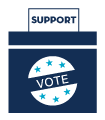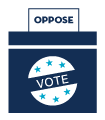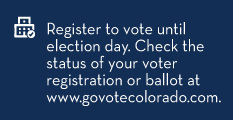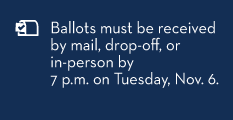Business on the ballot: Chamber & EDC voter guide

By Rachel Beck
Vice president, government affairs
Colorado Springs Chamber & EDC
This fall’s ballot is a long one, full of proposals on a number of critical state and local issues, as well as a host of candidates for federal, state and local offices, including, after nearly a decade with John Hickenlooper in the state’s top office, a new governor.
A number of this year’s proposals present two different approaches to some of the state’s most contested issues: for example, how we address the state’s transportation backlog, and how oil and gas wells coexist with adjacent uses.
These proposals take two forms, constitutional and statutory, and the difference is an important one. Nine of the issues on your ballot are proposals to amend the Colorado Constitution. Because constitutional amendments are effectively locked into our Constitution forever, it’s important to give these extra scrutiny. Thanks to a voter-approved measure on last year’s ballot, these must now be approved by 55 percent of voters to become law.
The Chamber & EDC typically does not support Constitutional amendments unless they address our fundamental rights and governing framework. The ballot also includes four proposed changes to Colorado statutes, which mean Colorado lawmakers can make changes, if needed, as unintended consequences of proposals are identified during implementation.
Because we work with elected officials from across the political spectrum, the Chamber & EDC does not endorse candidates.
In conjunction with our Government Affairs Council, following are our recommendations on issues affecting the state and local business climate and economy.

These constitutional amendments change the way legislative and congressional districts are drawn. Every decade, after the U.S. Census, the boundaries of congressional and state legislative districts are redrawn to reflect population changes. The system has been controlled by partisans, resulting in only three of 65 seats in the state’s House of Representatives and six of the 35 in the state Senate having competitive races. The rest are controlled by one party or the other. These amendments, backed by a broad bipartisan coalition, would create an independent commission that would draw district boundaries. Seats would be equally balanced among Republicans, Democrats, and independents – the largest group of voters in Colorado. A supermajority, including at least two of the unaffiliated representatives, would be required to finalize district boundaries.

This constitutional amendment raises state income taxes $1.6 billion each year to fund K-12 education. We oppose the amendment because it is riddled with policy problems and makes no guarantees that money would end up in classrooms or ensure teachers are paid well. It triggers a large tax increase on thousands of small businesses, farms, middle-income married couples and every homeowner in Colorado. The increase in corporate income tax would make it more difficult to attract new businesses to Colorado, since it takes our state from having among the lowest income tax rates to the eighth highest.

This proposal authorizes bonds for statewide road and bridge construction and maintenance. We support this proposal because it will address high-priority projects identified by the Colorado Department of Transportation. Bonds allow a jump-start on large projects and would be paid back from the state budget, which currently contributes very little to transportation.

This proposal raises state sales tax by $1 billion per year to fund a variety of transportation projects. We oppose this proposal because it would make our sales tax too high, creating a competitive disadvantage to our businesses, and because less than half the money goes to state transportation projects. If passed, the City of Colorado Springs would trade $50 million per year that’s dedicated to local roads for $18 million.
El Paso County Issue 1A: Support
This measure extends an existing local sales tax of 0.23% until 2028 to pay for personnel and equipment for the El Paso County Sheriff’s Office. We support this tax extension because it makes up a third of the Sheriff’s budget, funding patrol and detention deputies, investigators and support staff, as well as more wildland firefighting apparatus and emergency facilities and equipment. The county has grown significantly since the tax was first passed, and this measure helps fund critical public safety services.

This measure would authorize $180 million in bonds to pay for capital improvements in Colorado Springs Harrison School District 2. We support this bond initiative since it helps address critical capital needs, such as renovating school buildings, upgrading technology, and expanding two elementary schools in one of the city’s most challenged communities. Poor school performance was identified as a weakness for attracting and retaining businesses in our Economic Development Strategic Plan.
 |
 |
 |
|---|
Click here for a printable version of our 2018 Business Ballot Guide.
Rachel Beck is the vice president of government affairs for the Colorado Springs Chamber & EDC, which includes directing the organization’s local, state, and federal policy advocacy efforts; setting the organization’s legislative agenda; analyzing policy options; communicating business needs to lawmakers; serving as liaison to elected officials; and overseeing the Government Affairs Council. She has more than 18 years’ experience in municipal and state government policy, research, and strategic communication.
